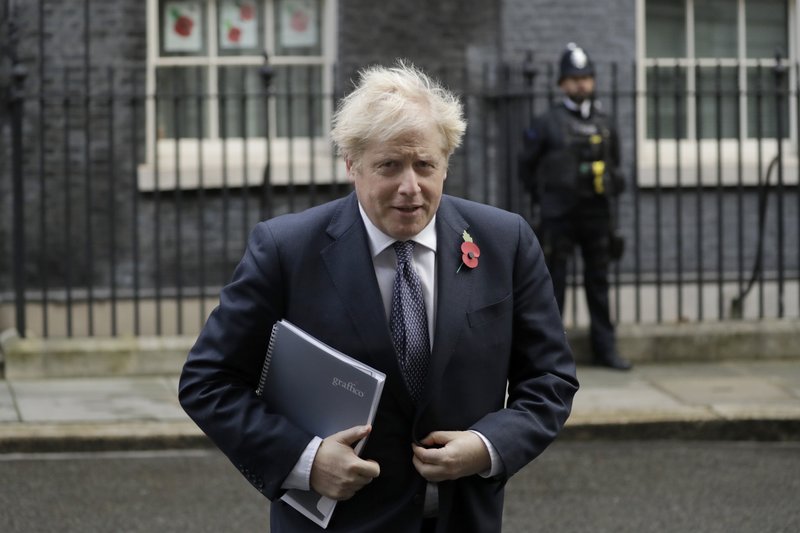British Prime Minister Boris Johnson has announced plans for strict regional measures to combat COVID-19 after England’s lockdown ends Dec. 2, sparking a rebellion by members of his own party who say the move may do more harm than good.
Johnson’s office said late Saturday that the government plans to return to a three-tiered system of restrictions, with areas facing different measures depending on the severity of their outbreaks. Though it is likely that a much-criticized 10 p.m. curfew on bars and restaurants will be altered, the tiers are likely to include tighter restrictions than when they were first used in October even as more communities are expected to be placed in the two highest virus alert categories.
Some of Johnson’s Conservative Party allies immediately demanded an impact analysis of the proposed restrictions so lawmakers can weigh the health benefits against harm to the economy, mental health and relationships.
Steve Baker, one of 70 lawmakers who have written to Johnson with their concerns, said they can’t support the approach unless the government can show the restrictions planned for after Dec. 2 will have an effect on decreasing COVID-19 transmission, “and will save more lives than they cost.”
Johnson’s Cabinet will meet Sunday to work out details of the plan before the prime minister presents it to the House of Commons on Monday. Parliament must approve the plan before the new measures take effect.
The debate comes as hope grows that vaccines may ultimately provide a way out of the pandemic, and public health officials say restrictions on social and business interactions across the U.K. have begun to slow the spread of the coronavirus.
Johnson’s office confirmed plans to begin a nationwide vaccination program next month, assuming regulators approve a COVID-19 vaccine. The government also says it will increase mass testing to combat the virus.
In the meantime, restrictions on day-to-day life will continue through the Christmas period.
“We’ll be going back into a tiered system, which is a far better way to tackle this on a localized approach,” Treasury chief Rishi Sunak told Sky News. “And with regard to Christmas, I think as frustrating as it is for all of us, Christmas is not going to be normal this year.’’
The original three-tiered regional approach was introduced on Oct. 12 as the government tried to control a surge in COVID-19 cases without resorting to a national lockdown.
Under those rules, the highest level of restrictions forced pubs and bars to close and people were advised not to travel outside their communities. The second tier barred people from meeting indoors with anyone from outside their household. Even at the lowest level, bars and restaurants were forced to close at 10 p.m. and meetings of more than six people were prohibited.
Now Johnson plans to tighten those measures.
The government’s scientific advisory group, known as SAGE, is expected to publish reports on Monday showing that the original three-tiered strategy wasn’t strong enough and recommending tougher restrictions when it returns.
The regional approach was suspended in November when Johnson finally imposed a lockdown in England. That decision came after public health officials warned that an exponential rise in new coronavirus infections was threatening to overwhelm the National Health Service as the winter flu season approached.
The lockdown closed non-essential business like many shops, gyms, bars, restaurants. It also banned most social gatherings but schools remain open.
Confirmed new cases of COVID-19 have started to drop across the U.K., with the number of positive tests during the past seven days falling 13.8% from the week before. Authorities reported 2,861 COVID-related deaths over the last seven-day period, 17 fewer than a week earlier. Still, the infection rate remains high, at 244 cases for every 100,000 people.
The U.K. has Europe’s deadliest COVID-19 outbreak, with more than 54,700 deaths.
Health Secretary Matt Hancock told reporters Friday that while the lockdown has been successful in slowing the spread of the virus, people need to keep following the rules.
Professor Jonathan Van-Tam, the government’s deputy chief medical officer, warned that any gains from the November lockdown could be quickly lost to a virus that takes “just seconds” to spread.
People should “keep up the pressure on this virus and push down on it as much as we can right to the end of the period (of lockdown),” he said.
(AP)












One Response
Given that the current lock-down has shuttered Shuls רחמנא לצלן but adamantly will not interfere with universities & schools remaining fully functional, is a transitivity, and shall never see any הצלחה.